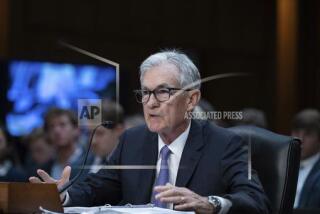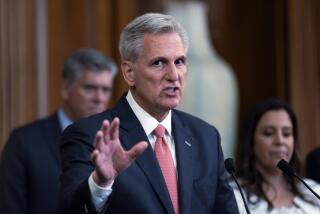Greenspan Cautions Congress to Slow Effort to Boost Economy
- Share via
WASHINGTON — Federal Reserve Chairman Alan Greenspan urged Congress on Thursday to wait a week or so before trying to rev up the economy. Moving too quickly, he suggested, could backfire if it caused long-term interest rates to rise.
Greenspan’s go-slow message, echoed by other government officials and private economists, appeared to have the intended effect. Congressional leaders said they were now inclined to delay action on a big economic stimulus package until the health of the economy becomes clearer.
Greenspan endorsed efforts to provide quick relief to the airline industry after last week’s terrorist attacks in New York and Washington. Commercial air traffic has been severely curtailed, and major carriers say they need federal assistance to avert financial ruin.
The U.S. economy has been struggling ever since the collapse of the technology investment bubble in early 2000, and much economic activity “ground to a halt” after last week’s attacks, Greenspan told members of the Senate Banking Committee.
Even so, he said, broader efforts to kindle a recovery should wait.
“I would strongly suggest that while there is an obvious strongly desired sense to move rapidly, that it’s far more important to be right than quick,” Greenspan said.
His admonition was repeated by Treasury Secretary Paul H. O’Neill, who said the Bush administration is considering a wide range of stimulus proposals, but wants more time to assess the impact of the terror attacks. It was repeated later Thursday by a panel of private economists in a closed meeting with members of the House Ways and Means Committee, according to participants.
The new mood marks a significant shift in tone for House Republicans, whose leaders had been talking about moving very quickly to enact as much as $180 billion in tax cuts and spending increases. Although Greenspan did not suggest the effort should be abandoned, his cautionary remarks may dampen enthusiasm for passing a big short-term stimulus package that could have unintended long-term consequences.
“I would not expect the formation of a package to take place before the next couple of weeks,” said House Majority Leader Dick Armey (R-Texas), who met privately with Greenspan on Wednesday.
Greenspan expressed concern about the possible effect of new tax and spending initiatives on interest rates. He said long-term rates have been rising in recent days, even as the central bank has pushed short-term rates down in an effort to stimulate more business and consumer spending. The Fed does not directly control long-term rates, which are determined by the bond market and reflect expectations of future economic conditions, particularly inflation.
Greenspan Reflects on Effects of Low Rates
Some economists contend that long-term rates are beginning to rise because the Bush tax-cut package approved by Congress last summer has significantly limited the government’s ability to use surplus funds to reduce the federal debt. The prospect of a bigger long-term debt burden puts upward pressure on interest rates.
Greenspan noted that low long-term rates helped buoy the economy after the collapse of the technology sector early last year. Low rates on mortgages, auto loans and other borrowings produced a boom in home sales and steady increases in consumer spending.
He said he found it “disturbing” that the trend might be reversing. “Until we find out . . . we are not going to know the appropriate balance of fiscal and monetary policy,” he said.
His concern could pour cold water on congressional proposals to accelerate some of the scheduled reductions in the Bush tax-cut package, or come up with new tax breaks that target businesses, investors or consumers.
Some Republicans have been lobbying to cut the tax on capital gains--the profits realized on sales of stocks, bonds, real estate and other investment assets. The politically contentious proposal is anathema to Democrats, and threatens to breach the bipartisan spirit that has prevailed in the capital since the Sept. 11 attacks. There also have been suggestions of a payroll tax cut that could get money into consumers’ pockets faster in the hope that new spending would stimulate the economy.
Now, Armey suggested, GOP leaders want to take their time, to allow the state of the economy to become clearer and to build a consensus across party lines.
House Minority Leader Richard A. Gephardt (D-Mo.) agreed with that strategy. He suggested that Congress had not even reached consensus on whether it would be a good idea to pass a stimulus package that went beyond the tax cuts and emergency spending already in the pipeline.
“Do we need a stimulus package?” he asked. “The jury is still out on that question.”
Some Republicans are also exploring the possibility of pushing legislation to give Bush more latitude to negotiate trade agreements without interference from Congress. They say the measure would send a positive signal to international markets and stimulate economic activity.
The concept of using expanded trade to promote economic growth received a hearty endorsement from Greenspan. He said the sense of global unity spawned by the terrorist attack might increase momentum to launch a new round of multinational talks to reduce trade barriers.
“A successful round would not only significantly enhance world economic growth, but also answer terrorism with a firm reaffirmation of our commitment to open and free societies,” he said.
More to Read
Get the L.A. Times Politics newsletter
Deeply reported insights into legislation, politics and policy from Sacramento, Washington and beyond. In your inbox twice per week.
You may occasionally receive promotional content from the Los Angeles Times.











